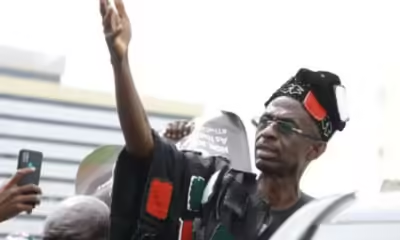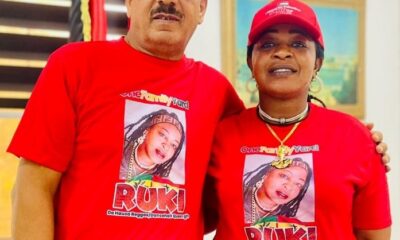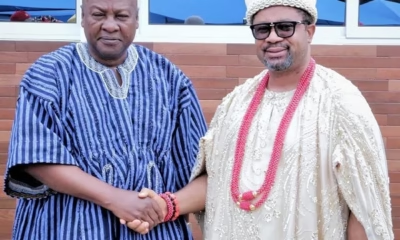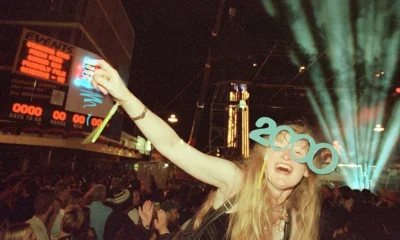Features
When at all will Ghanaian journalists honour Henry Ofori?
Published
4 days agoon
AFRICAN journalists have often criticised the people of the African continent for failing to give teeth to the various conventions to which they have voluntarily acceded, that ostensibly aim at making Africa as hospitable to all its inhabitants, as can be found in some other continents.
Many African countries still demand visas from Africans who want to visit their countries (despite the fact that the African Union was born in Addis Ababa a good sixty years ago.
Trade between African countries – even between the closest of African neighbours – often lags behind that which exists between African countries and European or American nations. Yes, some of these drawbacks were designed by Africa’s former colonialists to serve their own commercial interests. But how long will it take Africa to realise that they were conned by the colonialists and that they should now embark on an accelerated programme of promoting intra-African trade?
Now, here I am, an African journalist, criticising the continent’s political leaders, for failing to make African unity a real and tangible thing for me and my people. But how many journalists from other African countries do I know? Do I discuss Africa’s problems with them and work out common approaches by which to solve these problems? Do I become concerned when African journalists are maltreated in other African countries, as often happens? More important, if an African journalist is threatened with imprisonment or even death elsewhere on the continent, do I organise my country’s journalists to try and save our colleague from harm?
I hang my head in shame, for I do none of the things I have mentioned here. And (I am afraid) if my colleagues of the Ghana Journalists Association are honest, they will share my shame.
For – alas – I cannot easily recall any occasions when the GJA has called me to a meeting to discuss problems that have arisen between an African Government and its journalists. Indeed, neither can I recall a time when I have been asked to participate in a programme aimed at providing relief to Ghanaian journalists who have fallen foul of the boot of authority written big!
Thinking about these issues, it occurred to me that this was not always the case. One person attempted, long ago, to use his position as the then Secretary of the Ghana Press Club (later changed to the Ghana Journalists Association) to unite Africans on the continent in one “Pan-African Union of Journalists.”
His idea was to establish PANJUG as a “one-stop” continental mechanism, through which the concerns of African journalists could be made known to the African people and, in the final analysis, to the world.
That person was Henry Ofori, a humorist of the first order, who achieved fame as a major entertainer in the pages of three of the major newspapers in Ghana – the Daily Graphic, The Sunday Mirror and The Ghanaian Times. (Incidentally, Mr Ofori was my immediate predecessor as editor of the Ghana edition of the Pan-African magazine, DRUM. But I write this not because I have very warm feelings towards Mr Ofori personally, but I regard his example as one that should be tapped to serve the interests of the modern generation of Ghanaian and African journalists.)
First, from his position as Secretary of the Press Club, Ofori initiated moves that enabled the Club to be affiliated to the International Organisation of Journalists (IOJ) based in Prague.
This was a brave move on his part, because in those days, an organisation based in Prague could easily be tainted with the notion that it was a “Communist-front” body of some sort.
But Ofori was a fiercely independent thinker and the idea that he could be dictated to by anyone – Communist or Capitalist – would have made him break out in the uproarious laughter for which he was well known!
His hope was to use his seat on the IOJ to persuade his fellow African members of that body to form an African journalists united entity that would be wooed for membership by international journalistic organisations from all over the world.
Henry Ofori’s efforts at uniting African journalists did not yield the results he hoped for. The Convention People’s Party, then Ghana’s “One Party” that was supreme in everything, somehow got persuaded to back the efforts of Mr Kofi Batsa, editor of The Spark, to lead a rival Pan-African Journalists Organisation.
Ofori was a gentleman and did not fight back against Kofi Batsa and his supporters.
But Ofori’s efforts were acknowledged elsewhere in Africa: so much so that when he passed away in Ghana on September 4, 2013, at the age of 89, he received a lengthy obituary, composed of no less than 1,000 words, from the leading newspaper in SOUTH AFRICA, the Johannesburg Sunday Times. Ironically, Ghanaian newspapers, on the other hand, gave scant attention to his passing, though this writer did give him a very good send-off in The Ghanaian Times.
Who was this Henry Ofori? He was a unique character in Ghanaian and African journalism. His forte was his sense of humour, which he exhibited through articles so funny that they were received with warmth in both his native Ghana and elsewhere in Africa. Ofori was exposed to a huge African market through his connection with Drum magazine, which, from the late 1950s to the early 1970s, was publishing separate editions in South Africa, Central Africa, East Africa, Ghana and Nigeria.
The articles for each edition of Drum were compiled locally, but many articles were shared by all editions. Usually, the most important common commodity in all editions was the beautiful cover girl, photographed in full colour. But Henry Ofori’s humorous pieces, written under his pen-name, Carl Mutt, were also often printed in other editions. This helped to give the lie to the erroneous notion that Africans from different parts of the continent are indifferent to what made the people of other areas of Africa laugh or smile.
Henry Ofori’s writing life began in an exceptional manner. He was teaching at the Government Secondary Technical School at Takoradi (then one of the most prestigious educational institutions in Ghana) when the newly-established Daily Graphic, set up by the Mirror Group in London, made him an offer to leave teaching and become an in-house “off-beat” columnist.
Despite his popularity, no prizes have been established in his name to honour journalists who show exceptional promise in different aspects of the profession. Have Ghanaian journalists heard of, say, the “Pulitzer Prize”? Why can’t one be established in Ofori’s name?
Such a shame.
By Cameron DUODU
You may like

Palm nut soup is a Ghanaian dish that can be served with so many foods. It has a rich base of palm nuts combined with tomatoes and various vegetables that makes it very nutritious.
Preparation
Ingredients
– 1 kilogramme of palm nut
– Half kilogramme of beef
-One kilogramme of goat meat
-Three large salmon
-One full tuna
– A handful of turkey berries
-Two large onions
-4 large tomatoes
-3 large garden eggs
– One tin of mackerel
-Ten large peppers
– One large ginger
-2 cloves of garlic
– Four fingers of okro
– Salt to taste
Instructions
-Wash, cook palm nut, turkey berries, and pepper and add salt to it.
-Grind palm nut, turkey berries and pepper with mortar and pestle or mini food processor.
-Wash goat meat, beef, Tuna, salt and put on fire.
– Blend onion, garlic, ginger and tomatoes and pour on the goat meat.
– Add smoked tuna and salmon and okro to the soup.
-Use a spoon or ladle to skim off the surface oil.
-Garnish the soup with the okro or garden eggs as desired.
-Serve with fufu, banku or Omo tuo.

● Increases hydration
● Strengthens bones
● Promotes gut health
● Helps manage blood sugar and weight
● Protects against cancer
● Improves heart health
Source: Healthtips
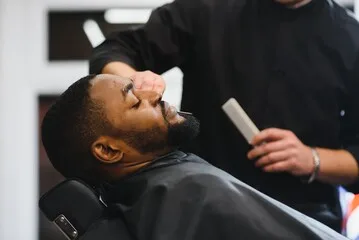
It is not easy looking for your barber if your hair has overgrown and you look like a bushman. It is even more serious if your moustache has crossed carpet and is seen entering into your nostrils, some straying into your left ear.
The problem is that some of us do not like changing barbers. My barber, for instance, is a very short akupa who often has to stand on his toes to reach the top of my head. But I maintained him because he understands the international shape of my head and gives me the right cut. Moreover, he has promised never to cut my ears.
Although, he has been cutting my hair for the last five years, I still do not know his name. I’ve never asked and he has never told me. It is a business relationship, not a family affair. He comes at certain specified dates, does his job, gets paid and vanishes.
When he was supposed to cut my hair two weeks ago, I waited in vain. Last weekend he didn’t show up either. Was the guy on strike? If he wanted more pay, he could come for a discussion, although I have been paying him better than his colleagues were getting per cut. I could even offer height allowance if he asked for it.
I was quite uncomfortable with the over-growing hair which everyone was reminding me of, so I undertook a search for the missing barber. The possibility was that other barbers would know his house and direct me accordingly. So from barber shop to barber shop I went asking if they had seen the shortest barber in town. No one seemed to know him.
I decided I couldn’t go another week without a cut, so I reluctantly went into the last shop and asked the barber there to do the job. He studied my head, nodded and asked me to sit on a stool outside and wait. He was finishing another person’s hair and then he’d jump on mine.
Soon, he called me in, and I told him I dislike nonsense.
He was stunned. “Massa, have I offended you?” he enquired worriedly. I said no. Then what was the matter? He begged me to explain.
“I don’t like the kind of haircut that would scare my boss,” I said. He laughed. I continued, “I don’t want my boss to see me and start running away; he should give me promotion.” The barber laughed and promised me a fashionable cut.
“I don’t want a fashionable cut. I want it simple according to the shape of my head.”
“Don’t you like Jojo Special? Your girlfriend will dig you. She’ll believe!”
“Just do as I say.”
I was pretty sure the guy was going to mess me up like I had done to some two or three. The Law of Karma. In Legon I told my room-mate, Akotey Anaara, that I was the best barber the breadth of the country. He brought his head platter and I gave him a wonderful design.
The next morning when he went for lectures, everyone including the lecturer asked him whether he was sick. Actually, the cut I gave him made him look like one of those dull-looking mental patients who often escape from the Psychiatric Hospital and were seen directing traffic or getting into some.
Akortey Anaara had to find another guy to shave the damn hair off his skull and it was even worse. He looked like an obrafor (human head-cutter). His girlfriend didn’t recognise him.
Well, when the barber was cutting my hair, I realised that many people were lining up to have theirs cut today too. When I asked him why his customers were so many today, he said they were preparing for Easter and needed ‘wild’ hairdos to impress the girls in the village. It was then that I knew preparations for the Easter were well underway.
In fact, when Easter is approaching and it is amusing to see the seriousness people attach to the celebration, especially when they are travelling from the city to the villages and cottages. The idea is that you must impress rural girls.
Actually some people start saving for well over six months so that preparations for the occasions are not beset with financial bad-weather, monetary El-Nino or back pocket load-shedding.
For the young man, preparations border on having a stylish haircut, a second-hand but colourful camboo, jeans, third-hand pairs of socks, bottle of Kasapreko Gin, singlet, fashionable shirts and some trousers and shorts. The idea is to go and show to the folks that he is not a hopeless person in the city, but a prospering gentleman who must, therefore, be admired and loved by the girls.
Some money is set aside for ‘show,’ that is buying drinks for friends and for inducing young girls for seduction on Easter Sunday under the cover of darkness. Whatever monies that remain is just enough for transportation back to the city. Such monies are never touched because if you do, you’ll remain in the village or be forced to walk back to the city.
It is the preparation made by the women-folk that is even more interesting. The kaba and slit must be of ultra-modern and custom design so that the wearer can look like a vulture which is about to take off. Then the hairdo, the lip-sticks, the full-shoes, whatever. If the typical celebrant is not careful, she would finally look like a crow.
She would be seen in various colours on Easter Sunday during church service, and it is always a sight like to remember.
Some of the areas where Easter is best celebrated are Peki, Kwahu (Okwahu United, Obo Kwahu and all), Tapa Abotoase, some parts of Ashanti and Brong and some cottages in Central, Eastern and Western Regions. You’ll be surprise they never forget the death and resurrection of Jesus Christ.
With every Easter though, it is the Palm Sunday which matters to some people. The triumphant entry into Jerusalem is of more significance to them than his death and resurrection, because of the ‘palm element.’
Palm Sunday must indeed be marked with the copious drinking of palmwine and if necessary, the eating of fufu and palmnut soup, a ritual they claim is endorsed by the Holy Spirit.
This article was first published on Saturday, April 9, 1999

Tooth decay cases rises in Tema

Cake Tekniks holds 59th graduation ceremony

Volta College Foundation donates GH¢9,000 to 9-yr-old fire victim
Trending

 Politics7 months ago
Politics7 months agoVoter Register Discrepancies: NDC to stage nationwide protests against EC

 News8 months ago
News8 months agoArise Royals Montessori School Marks 2nd Graduation.

 Entertainment9 months ago
Entertainment9 months agoGhanaian musician Champions Gaza Peace with New Track

 News4 months ago
News4 months agoKing of Igbo Community in Ghana congratulates Mahama as President-elect of Ghana.

 More8 months ago
More8 months agoYoung people urged to develop their talents

 Entertainment10 months ago
Entertainment10 months agoSteps to receive an official GWR certificate – Details from mother of a Ghanaian record holder

 News10 months ago
News10 months agoCancer Support Network Foundation holds gala

 Tech9 months ago
Tech9 months agoWatch out for sharks: The bizarre history of internet outages





